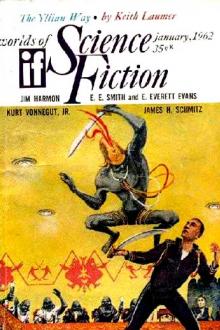Bat Wing, Sax Rohmer [top 20 books to read .txt] 📗

- Author: Sax Rohmer
Book online «Bat Wing, Sax Rohmer [top 20 books to read .txt] 📗». Author Sax Rohmer
But even as we stepped from the car, the great church-like oaken doors were thrown open, and there, framed in the monkish porch, stood the tall, elegant figure of the Colonel.
“Gentlemen,” he cried, “welcome to Cray’s Folly.”
He advanced smiling, and in the bright sunlight seemed even more Mephistophelean than he had seemed in Harley’s office.
“Pedro,” he called, and a strange-looking Spanish butler who wore his side-whiskers like a bull fighter appeared behind his master; a sallow, furtive fellow with whom I determined I should never feel at ease.
However, the Colonel greeted us heartily enough, and conducted us through a kind of paved, covered courtyard into a great lofty hall. Indeed it more closely resembled a studio, being partly lighted by a most curious dome. It was furnished in a manner quite un-English, but very luxuriously. A magnificent oaken staircase communicated with a gallery on the left, and at the foot of this staircase, in a mechanical chair which she managed with astonishing dexterity, sat Madame de Stämer.
She had snow-white hair crowning the face of a comparatively young woman, and large, dark-brown eyes which reminded me strangely of the eyes of some animal although in the first moment of meeting I could not identify the resemblance. Her hands were very slender and beautiful, and when, as the Colonel presented us, she extended her fingers, I was not surprised to see Harley stoop and kiss them in Continental fashion; for this Madame evidently expected. I followed suit; but truth to tell, after that first glance at the masterful figure in the invalid chair I had had no eyes for Madame de Stämer, being fully employed in gazing at someone who stood beside her.
This was an evasively pretty girl, or such was my first impression. That is to say, that whilst her attractiveness was beyond dispute, analysis of her small features failed to detect from which particular quality this charm was derived. The contour of her face certainly formed a delightful oval, and there was a wistful look in her eyes which was half appealing and half impish. Her demure expression was not convincing, and there rested a vague smile, or promise of a smile, upon lips which were perfectly moulded, and indeed the only strictly regular feature of a nevertheless bewitching face. She had slightly curling hair and the line of her neck and shoulder was most graceful and charming. Of one thing I was sure: She was glad to see visitors at Cray’s Folly.
“And now, gentlemen,” said Colonel Menendez, “having presented you to Madame, my cousin, permit me to present you to Miss Val Beverley, my cousin’s companion, and our very dear friend.”
The girl bowed in a formal English fashion, which contrasted sharply with the Continental manner of Madame. Her face flushed slightly, and as I met her glance she lowered her eyes.
“Now M. Harley and M. Knox,” said Madame, vivaciously, “you are quite at home. Pedro will show you to your rooms and lunch will be ready in half an hour.”
She waved her white hand coquettishly, and ignoring the proffered aid of Miss Beverley, wheeled her chair away at a great rate under a sort of arch on the right of the hall, which communicated with the domestic offices of the establishment.
“Is she not wonderful?” exclaimed Colonel Menendez, taking Harley’s left arm and my right and guiding us upstairs followed by Pedro and the chauffeur, the latter carrying our grips. “Many women would be prostrated by such an affliction, but she—” he shrugged his shoulders.
Harley and I had been placed in adjoining rooms. I had never seen such rooms as those in Cray’s Folly. The place contained enough oak to have driven a modern builder crazy. Oak had simply been lavished upon it. My own room, which was almost directly above the box hedge to which I have referred, had a beautiful carved ceiling and a floor as highly polished as that of a ballroom. It was tastefully furnished, but the foreign note was perceptible everywhere.
“We have here some grand prospects,” said the Colonel, and truly enough the view from the great, high, wide window was a very fine one.
I perceived that the grounds of Cray’s Folly were extensive and carefully cultivated. I had a glimpse of a Tudor sunken garden, but the best view of this was from the window of Harley’s room, which because it was the end room on the north front overlooked another part of the grounds, and offered a prospect of the east lawns and distant park land.
When presently Colonel Menendez and I accompanied my friend there I was charmed by the picturesque scene below. Here was a real old herbal garden, gay with flowers and intersected by tiled moss-grown paths. There were bushes exhibiting fantastic examples of the topiary art, and here, too, was a sun-dial. My first impression of this beautiful spot was one of delight. Later I was to regard that enchanted demesne with something akin to horror; but as we stood there watching a gardener clipping the bushes I thought that although Cray’s Folly might be adjudged ugly, its grounds were delightful.
Suddenly Harley turned to our host. “Where is the famous tower?” he enquired. “It is not visible from the front of the house, nor from the drive.”
“No, no,” replied the Colonel, “it is right out at the end of the east wing, which is disused. I keep it locked up. There are four rooms in the tower and a staircase, of course, but it is inconvenient. I cannot imagine why it was built.”
“The architect may have had some definite object in view,” said Harley, “or it may have been merely a freak of his client. Is there anything characteristic about the topmost room, for instance?”
Colonel Menendez shrugged his massive shoulders. “Nothing,” he replied. “It is the same as the others below, except that there is a stair leading to a gallery on the roof. Presently I will take you up, if you wish.”
“I should be interested,” murmured Harley, and tactfully changed the subject, which evidently was not altogether pleasing to our host. I concluded that he had found the east wing of the house something of a white elephant, and was accordingly sensitive upon the point.
Presently, then, he left us and I returned to my own room, but before long I rejoined Harley. I did not knock but entered unceremoniously.
“Halloa!” I exclaimed. “What have you seen?”
He was standing staring out of the window, nor did he turn as I entered.
“What is it?” I said, joining him.
He glanced at me oddly.
“An impression,” he replied; “but it has gone now.”
“I understand,” I said, quietly.
Familiarity with crime in many guises and under many skies had developed in Paul Harley a sort of sixth sense. It was a fugitive, fickle thing, as are all the powers which belong to the realm of genius or inspiration. Often enough it failed him entirely, he had assured me, that odd, sudden chill as of an abrupt lowering of the temperature, which, I understood,





Comments (0)